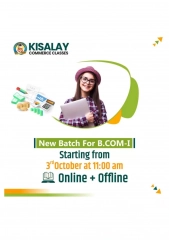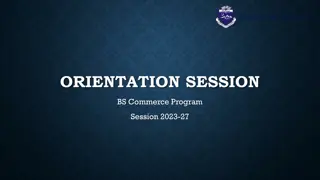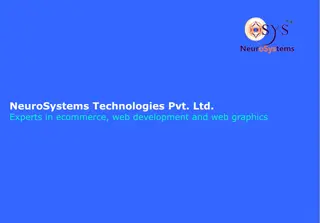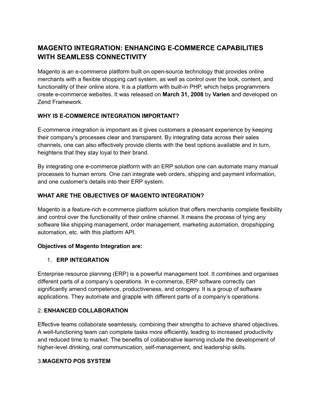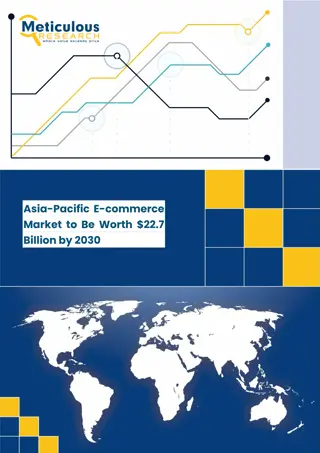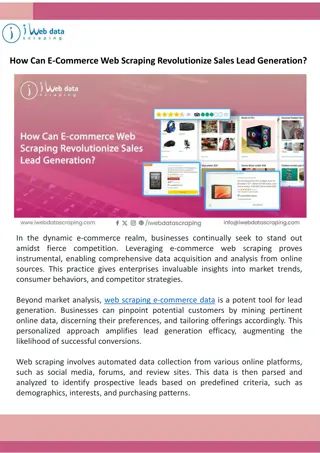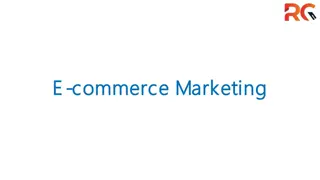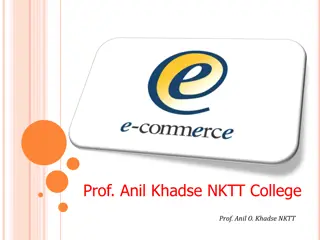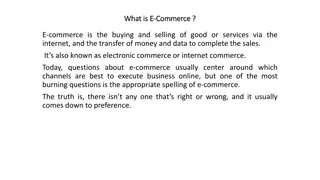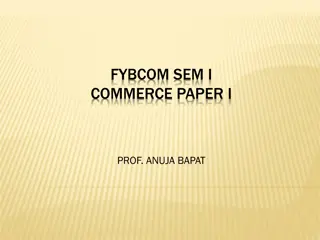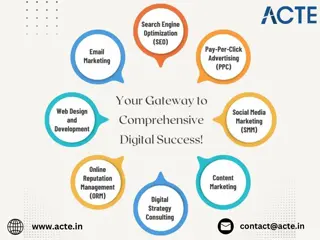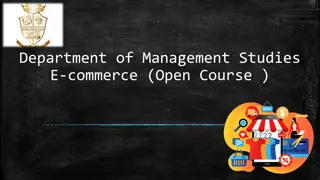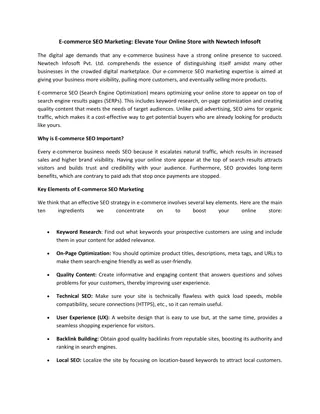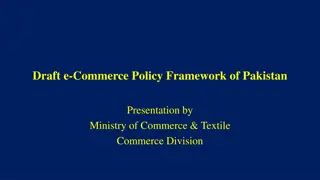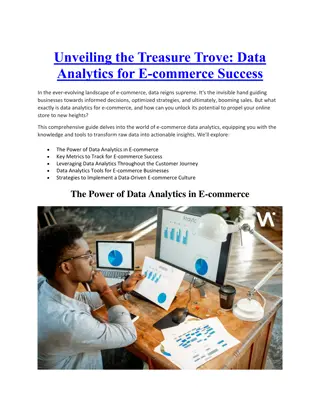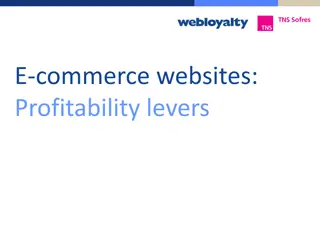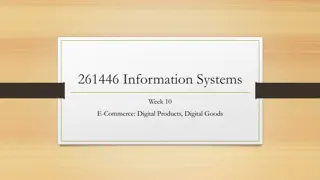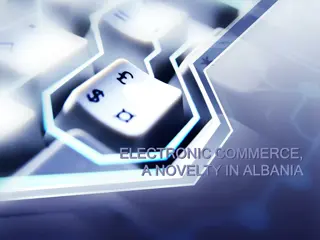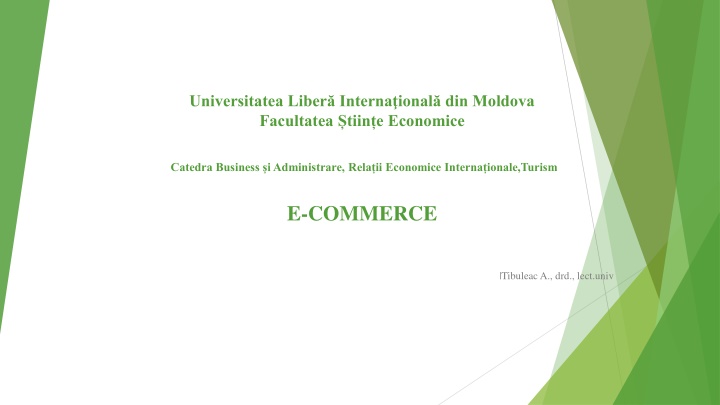
E-Commerce Course: Impact, Opportunities, and Challenges
This e-commerce course at Universitatea Liber Internațional din Moldova explores the impact of the Internet and technological innovations on marketing, different e-business models, and the challenges and opportunities in e-commerce. Students will develop skills in creating and managing online businesses, understanding security and ethical issues, and promoting international cooperation. Prerequisites include Microeconomics, Macroeconomics, Fundamentals of Marketing, and IT software. Recommended readings and online resources are provided to enhance learning in this dynamic field.
Download Presentation

Please find below an Image/Link to download the presentation.
The content on the website is provided AS IS for your information and personal use only. It may not be sold, licensed, or shared on other websites without obtaining consent from the author. If you encounter any issues during the download, it is possible that the publisher has removed the file from their server.
You are allowed to download the files provided on this website for personal or commercial use, subject to the condition that they are used lawfully. All files are the property of their respective owners.
The content on the website is provided AS IS for your information and personal use only. It may not be sold, licensed, or shared on other websites without obtaining consent from the author.
E N D
Presentation Transcript
Universitatea Liber Internaional din Moldova Facultatea tiin e Economice Catedra Business i Administrare, Rela ii Economice Interna ionale,Turism E-COMMERCE |TibuleacA., drd., lect.univ
Object of discipline This course will help students to: Understand the impact of the Internet, the World Wide Web, and emerging technological innovations on the marketing of goods and services. Familiarize with various types of e-business like Business-to-consumer (B2C) and business-to-business (B2B) and Consumer-to Consumer etc. The opportunities and challenges of e-commerce for consumers and for sellers/producers will be thoroughly explored. Be aware of a wide range of electronic commerce issues like Security, digital money, and ethical, legal and environmental, as a foundation for continual learning in the dynamic e-commerce environment Develop a deeper understanding of the critical attributes of a successful participant in today s continuously changing markets. Apply fundamental concepts learned in economics and marketing classes, integrated with computer skills to create an online business.
Course Outcomes Code Specific outcomes for the course Knowledge K 1 K 1.1 To understand the concept and main principles of E-commerce, and its importance for international business, in the context of international cooperation K 2.1 To understand the security concerns and principles of e-commerce, the security of payments and the privacy policy for economic agents and individuals. K 3.1. To understand the various challenges or opportunities that e-commerce presents for the international economic relations, how it helps to develop international businesses and cooperation. Abilities K 2 K 3 S 1 S 2 S 1. 1 The ability to explain and develop solutions for implementing an e-commerce system/business. S 2. 1 The ability to develop strategies for improvement of e-commerce businesses, to estimate the national policy effect on this field S 3. 1 To apply the ethics of e-commerce towards the shoppers and sellers, to understand the limits between ethical an unethical behavior. Competences S 3 C 1 C 1. 1 The competence to collect and to interpret data related to e-sales, and its implications on general trade development of the country. C 2. 1 To evaluate the role of e-commerce for international trade relations of the country, and its implications on general economic development of the country C 3. 1 The application of knowledge and abilities to promote the international cooperation both in terms of phisical trade and e-trade. C 2 C 3
Prerequisites Microeconomics Macroeconomics Fundamentals of Marketing IT software
Bybliography Requiered readings: Watson T., Berthon P.Electronic commerce. The strategic perspective. New York:Palgrave MacMillan, 2008, 115 p. Andam Z. E-commerce and e-Business. Washington:UNDP, 2003, 45 p. Additional sources: Information economy report 2015.Geneva: UNCTAD, 2015, 136 p. Global E-commerce Report 2016 https://www.ecommercewiki.org/wikis/www.ecommercewiki.org/images/5/56/Global_B2C_Ecommerce_Report_2016. pdf Links: E-commerce lessons online http://www.aiu.edu/online/AIUFILES/Electronic%20Commerce/Lesson%201/Index.htm http://courses.aiu.edu/ec_lessons.html WEB encyclopedy http://www.encyclopedia.com/social-sciences-and-law/economics-business-and-labor/businesses- and-occupations/electronic-commerce E- Marketer https://www.emarketer.com/ E-commerce tutorials - https://www.tutorialspoint.com/e_commerce/e_commerce_tutorial.pdf The future of e-commerce http://www.criteo.com/media/4094/ovum-the-future-of-e-commerce-the-road-to-2026.pdf Global retail e- commerce index https://www.atkearney.com/documents/10192/5691153/Global+Retail+E- Commerce+Keeps+On+Clicking.pdf/abe38776-2669-47ba-9387-5d1653e40409
Assessment Methods Nr Type of assignment Share (%) of the final grade 1. Work in group, projects, simulations. Presentation of contribution activity in the classroom 30 20 2. individual tasks, testing, 3. 4. 5. 6. Class activity Class Attendance Final Exam Total 5 5 40 100

